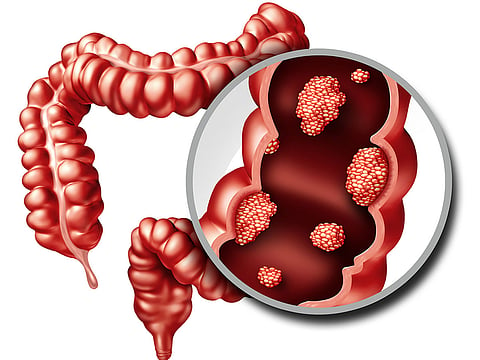Screen for colon cancer
Catch the disease early with one of the most effective screening tests

Colorectal cancer is the third-most common cancer in men after lung and prostrate cancers and the second-most common in women after breast cancer. This year, more than 1.8 million people worldwide have already been diagnosed with colorectal cancer, according to the World Cancer Research Fund.
Luckily, over the years, death rates from this type of cancer have come down thanks to effective screening tests.
“About 90 per cent of colon cancers develop from benign polyps [abnormal growths] over a period of about 10 years,” says Dr Ajit Tharakan, Specialist Gastroenterologist at Amber Clinics. “If such polyps are detected early through screening, they can be removed with simple techniques preventing colorectal cancer.”
A Western lifestyle with a diet high in processed meat, red meat, fat and alcoholic drinks has been found to increase the risk while wholegrains, foods with fibre and dairy products have been known to reduce the likelihood of getting it.
In the UAE, 30 per cent of all diagnosed cancers are colorectal cancers. The best way to catch the cancer early and reduce your risk is to get regular screening tests, says Dr Tharakan.
Simple tests such as faecal occult blood test look for blood in stool caused by polyps and small cancers, which you cannot see with your naked eye. Experts advise opting for these tests when you turn 45 if you have a family history of colorectal cancer or inflammatory bowel disease.
Everyone should get a colonoscopy as they hit 50. “It is the most effective screening test available — it’s simple, safe and efficient, and if polyps are detected, they can be removed in the same session,” says Dr Tharakan. “This way, you prevent them from turning cancerous.”
A thin tube fixed with a light and a video camera is introduced into the rectum as part of the procedure, which allows the doctor to see the lining of the colon.
In many cases, colon cancer does not cause any symptoms. So screening is important. Alarming symptoms, however, are diarrhoea, constipation, bloating, blood in stool or change of bowel habits. If you experience these symptoms, consult a doctor immediately.


